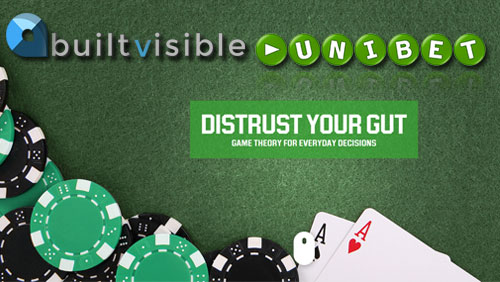Lee Davy sits down with Robyn Lodge and Liam Fisher, of the SEO and content marketing kings Builtvisible, to talk about their latest project with Unibet.
“We Build Brands Online.”
 That’s the claim confronting you after landing on the Builtvisible website – a company that specializes in brand visibility.
That’s the claim confronting you after landing on the Builtvisible website – a company that specializes in brand visibility.
Unibet now has their full attention. They have created an interactive article called Distrust Your Gut: Game Theory for Everyday Decisions. It’s a smart and savvy way of mixing play with education to learn about the power of Game Theory.
I sat down with two of the team’s stars: Robyn Lodge and Liam Fisher. This is what they had to say.
Who are Builtvisible?
“We are a digital agency that provide our clients with solutions for their SEO, creative content marketing and brand building. We do this in a myriad of ways. For Unibet we have created interactive content to try and get the users engaged.”
Do you specialize in gambling companies?
“We work with a wide range of companies. Unibet approached us to help put their name out there, and we were very grateful to get the opportunity. We are confident that we have created something that the gambling audience is really interested in; responsible gambling is a big trend at the moment, and we wanted to put something together that might help gamblers (and anyone else) put a little more thought into their decisions. We take the project all the way from conception to delivery.”
Interactive content: gut feel or rational decision?
“We think the interactive element is extremely powerful. Game Theory is a heavy topic. The way in which such a topic is packaged is crucial in making it accessible;our Monty Hall Problem and Prisoner Dilemma gamesgives the reader the opportunity to try their hand at these classic problems, and this is a great way to engage people’s interests and visually understand game theoretic principles.”
Why did you choose Game Theory as your choice of article topic for Unibet?
“Game Theory was a topic that we found very interesting. When you study the way people make their gambling decisions, you realize that every life decision can also be broken down in Game Theoretic terms. It was an exciting topic for us, and we believe it will be exciting for the readers.”
I’m a gut instinct kind of guy; your article says I should spend more time thinking before acting. Why is that?
“You need to get your brain involved as much as possible. The Monty Hall Problem is a great example of how intuitive these things can seem from the outset, but when you break down the Math the answer works out quite differently.
“In the Monty Hall Problem you are presented with three doors. Behind one of these doors is a prize. Behind the other two are booby prizes. You are given the option to choose one of three doors. After choosing a door, the simulation reveals one of the other doors you didn’t choose to reveal a booby prize. You are then given the opportunity to either stick with your original choice or switch to the other remaining closed door.
“When this exercise first landed in academic journals a lot of smart people shot it down. We’re talking about mathematicians, game theorists – very smart men and women. They maintained that switching doors made no difference whatsoever. It also felt counter intuitive to change your mind. But if you break the problem down and apply some logic, switching doors is the right play.
“When you break it down into probability you can see that your original choice was 1:3. Now the simulation has revealed one booby prize, you now have a 1:2 choice. This is why making a new choice makes more sense. It makes you wonder if something that feels as intuitively correct as not switching doors in the Monty Hall Problem is actually incorrect, what other problems are we approaching with an incorrect mindset?”
I am a gut instinct type of guy. When I analyze why I am like this it’s because I fear Math. Learning it slows me down so I make decision by gut because it’s quicker.
“That’s very much the story for a lot of people. Very few people crack out the decision tables and start making mathematical judgments in every day situations. There are some lessons here though. Being skeptical of your initial gut reaction is a worthwhile thing. Also the world is vastly complex. I think there will always be cases where you have to take calculated risks. Don’t ever feel you can’t take any risks. There will be times when you know the odds are against you, and you are fine with that. You evaluate the worst-case scenario and it doesn’t appear so apocalyptic and so you take the chance.”
For the full interactive article and to try these problems for yourself,check out Distrust Your Gut: Game Theory for Everyday Decisions by clicking on the link.





